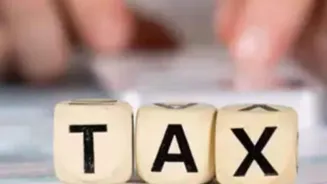Revised Income Tax Bill 2025: Income Tax Bill 2025 marks a landmark shift in the country’s direct tax framework. Introduced in Parliament on August 11, 2025, by Finance Minister Nirmala Sitharaman, the legislation
aims to replace the nearly 65-year-old Income Tax Act, 1961. The new bill incorporates recommendations from a parliamentary select committee and is designed to streamline tax laws, modernize compliance processes, and resolve long-standing ambiguities in interpretation.
The bill’s core objectives include simplicity and clarity in the law, achieved through plain language, logical restructuring of sections, and the removal of redundant provisions. It also strengthens faceless administration, enabling digital collection of information and assessments to minimize personal interaction and enhance transparency.
In addition, the bill introduces a unified tax year, seeking to harmonize assessment timelines for smoother compliance and reduced litigation. By refining rules and offering precise definitions, it aims to reduce disputes, close interpretational gaps, and limit court challenges.
1. Income Tax Slabs (New Regime) — Have The Tax Slabs Changed?
The Income Tax Bill 2025 retains the existing rates under the new regime while introducing several structural changes to simplify compliance and provide targeted reliefs.
- Up to Rs 4,00,000 – Nil
- Rs 4,00,001 to Rs 8,00,000 – 5%
- Rs 8,00,001 to Rs 12,00,000 – 10%
- Rs 12,00,001 to Rs 16,00,000 – 15%
- Rs 16,00,001 to Rs 20,00,000 – 20%
- Rs 20,00,001 to Rs 24,00,000 – 25%
- Above Rs 24,00,000 – 30%
The bill also increases the rebate threshold, offering a 100% rebate of income tax (up to Rs 12,500) for incomes up to Rs 5 lakh. A new tapering rebate system offers up to Rs 60,000 in relief for incomes of up to Rs 12 lakh, with the benefit gradually decreasing for higher incomes.
Other key provisions include:
- Normal Deduction – 30% deduction of house property income after municipal tax.
- Interest Deduction – Interest on pre-construction home loans can be deducted for both self-occupied and rented properties in five equal installments post-completion.
- Commuted Pension Deduction – Now available equally to employees and non-employees if received under listed funds.
- Simplified Capital Gains – A complete restructuring of capital gains rules, with clear provisions for taxation of cryptocurrencies and other digital assets as capital gains.
2. How Does The Revised Bill Impact Businesses & MSMEs?
- Presumptive Taxation – Threshold raised to Rs 2 crore for businesses and Rs 75 lakh for professionals, making compliance easier for MSMEs and professionals. Taxpayers opting for this scheme must report profits under it for five consecutive years; otherwise, they must maintain audited books.
- MSME Redefinition – Definitions aligned with the official MSME Act for consistency and broader inclusion.
- Inter-Corporate Dividends – Section 80M deduction withdrawn, altering the tax treatment for corporate group structures.
- NIL-TDS Certificates – Taxpayers with no tax liability can issue advance nil-deduction certificates to reduce procedural delays.
3. Reforms for Asset Owners & Investors
- House Property Valuation – Tax will be computed on the higher of actual rent received or deemed rent, with language clarified to remove ambiguity around the term “normal course.”
- Vacant Property Relief – Temporary vacancy of commercial properties exempted from notional rent tax.
- Associated Enterprises – Shareholding limits revised for determining tax implications in cross-border transactions.
4. What Are The Special Provisions & Exemptions Offered?
- Unified Pension Scheme – Certain subscribers under the 2025 scheme will enjoy full tax exemption on benefits.
- International Investors – The Saudi Public Investment Fund and its affiliates have been granted tax exemption status in India.
5. No ITR Filing Relief for Small Taxpayers in New Bill?
The new Income Tax Bill 2025 retains the rule that refunds can only be claimed by filing a return, rejecting a key panel suggestion to exempt small taxpayers from this requirement. Experts say this means many, including senior citizens with incomes below the taxable limit, will still need to file returns just to claim TDS refunds, failing which they risk penalties or prosecution.
The New Income Tax Bill 2025 is slated to take effect from April 1, 2026, giving taxpayers, businesses, and authorities ample time to gear up for its provisions.















